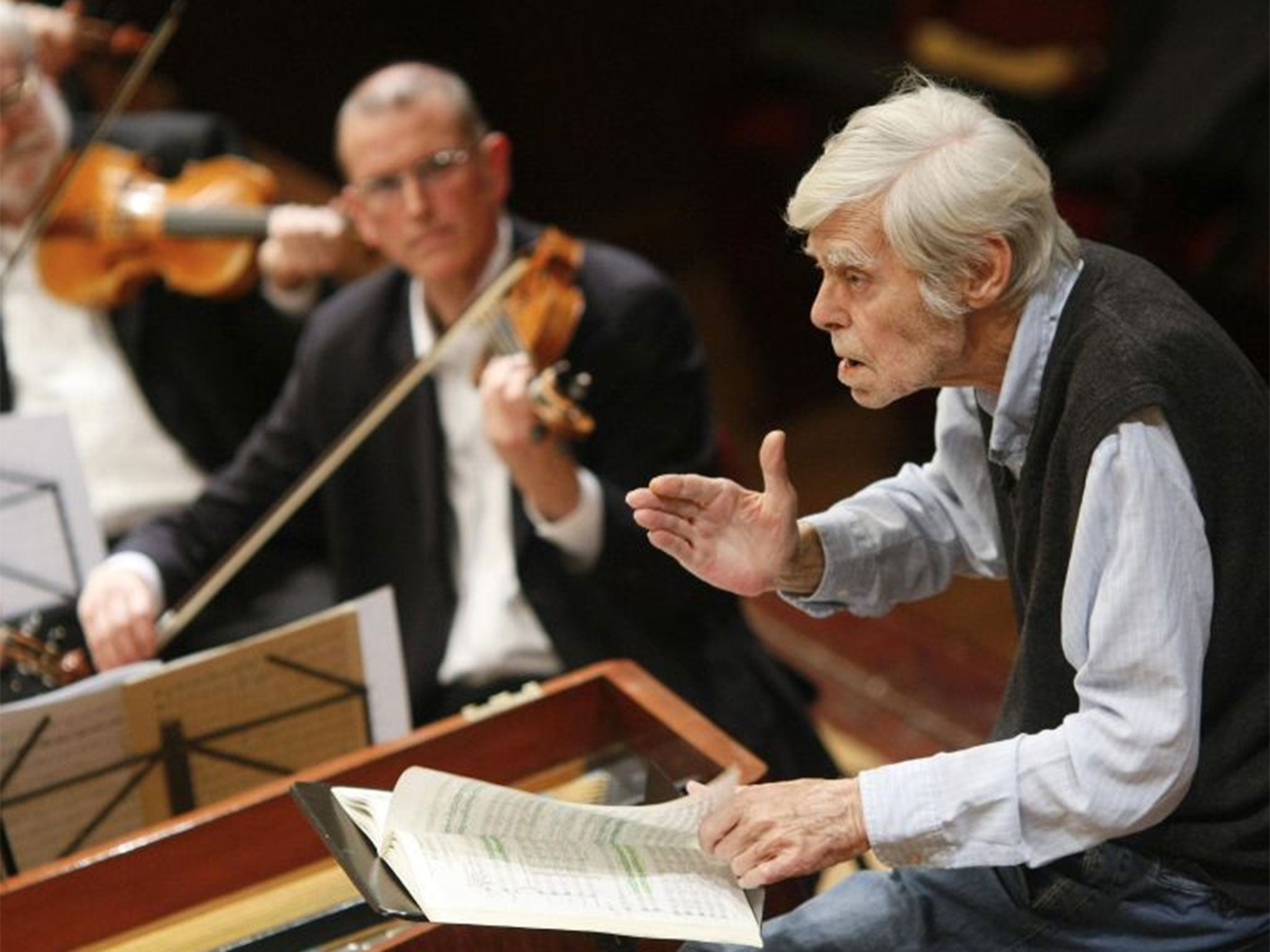Frans Bruggen: Conductor who founded the Orchestra of the Eighteenth Century and was also a leading avant-garde recorder player
He was able to foster a sense of loyalty and rapport seldom seen in conductors

The conductor Frans Brüggen was one of several significant and influential Dutch figures on the Early Music scene during the second half of the 20th century – along with Ton Koopman, Anner Bylsma, the Kuijken family, Max van Egmond, Gustav Leonhardt, and others.
But the avant-garde attracted him too. He began as a recorder player, having studied with Kees Otten, and at 21 was one of the youngest professors ever appointed to the Royal Conservatory of the Hague. His academic career continued with appointments in the US: at Harvard – as Erasmus professor of late baroque music; and at the University of California, as Regent’s Professor.
It was the Italian composer Luciano Berio who encouraged him to take on a performing career and in 1966 wrote a piece for him, Gesti – venturing into some rarely explored areas of recorder technique – to help him on his way. In 1981 the Dutch composer Louis Andriessen wrote what became one of Brüggen’s favourite encore pieces, Ende, for two alto recorders played simultaneously, with sensational effect. He was also a member of the avant-garde ensemble Sour Cream with fellow recorder players Kees Boeke and Walter van Hauwe.
His enduring reputation, however, rests on his work with 18th- and early 19th-century music, for which in 1981 he founded the Orchestra of the Eighteenth Century, currently comprising 55 musicians from 23 countries – and the many recordings that he made, with them and with other ensembles in the Netherlands and elsewhere. His performances of classical composers using period instruments displayed clarity, vitality and a keen sense of style, most notably in his recordings of the complete Beethoven symphonies, which he recorded twice, in 1994 and more recently in 2011 (released in 2012).
Of this later cycle, critics commented on the essential humanity of Brüggen’s Beethoven, and his facility for letting the music unfold and progress naturally, rather than forcing on to it an interpretative solution for the sake of dramatic or emotional effect.
In his style, Brüggen was no imperious commander. The Orchestra of the Eighteenth Century adored him and he fostered a wonderful loyalty, rapport and unity of purpose between players and conductor that was seldom found elsewhere.
One of Brüggen’s earliest appearances in Britain was in April 1957 as a member of the Telemann Trio in a programme that included the first performance of a Capriccio for treble recorder, violin and harpsichord by Wilfred Josephs. In December 1966 he was again at the Wigmore Hall, the first half of the recital comprising music by Bach, Telemann and Van Eyck and the second featuring the newly composed Gesti and Andriessen’s Sweet (sic) for Recorders (1964), also written for Brüggen.
The Berio was performed in total darkness save for one spotlight illuminating the soloist on the platform, a device that served to concentrate attention closely on the extraordinary movements of the player’s fingers and mouth. Brüggen was alone onstage during the entire recital, a challenging situation that was overcome by his fine artistry and his ability, as one critic observed, “to transcend all the instrument’s legendary limitations” and to hold his audience spellbound.
In the following year Brüggen’s recording of Handel’s six sonatas was declared by Stanley Sadie to be “the best recorder playing I have ever encountered”, citing “sweet tone, extraordinary agility, perfect intonation and musicianly shaping”, making the record “a joy”.
In August 1967 he was at the Edinburgh Festival where Conrad Wilson, writing in The Herald, recalled him as “an agile, sprightly young virtuoso of the recorder, prancing on to the platform of the Freemasons’ Hall”. He was to return to Edinburgh many times over the years, as a recorder player but later as a conductor, with his own orchestra and with the Scottish Chamber Orchestra. In 1991 he made his Salzburg Festival debut with the Orchestra of the Age of Enlightenment.
Operatic ventures included Mozart’s Mitridate, re di Ponto in Zurich (1998) and Gluck’s Orfeo ed Euridice with the Opéra de Lyon. Brüggen also liked big orchestras, and later conducted the Royal Concertgebouw, the Vienna Philharmonic, the Chicago Symphony, the Zurich Tonhalle, the City of Birmingham Symphony, the Stockholm Philharmonic and the Orchestre de Paris.
He won the Unesco Music Prize in 1997 and was appointed Knight of the Order of the Netherlands (2003) and Order of the House of Orange (2010). Brüggen was married to the Dutch art historian Machtelt Israëls, who survives him with their two daughters, Zephyr and Eos.
Franciscus Jozef Brüggen, conductor and recorder player: born Amsterdam 30 October 1934; married Machtelt Israëls (two daughters); died Amsterdam 13 August 2014
Subscribe to Independent Premium to bookmark this article
Want to bookmark your favourite articles and stories to read or reference later? Start your Independent Premium subscription today.

Join our commenting forum
Join thought-provoking conversations, follow other Independent readers and see their replies